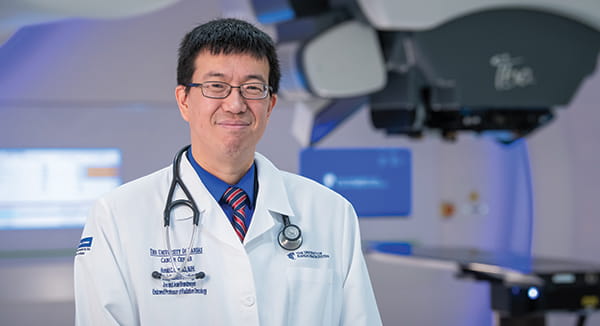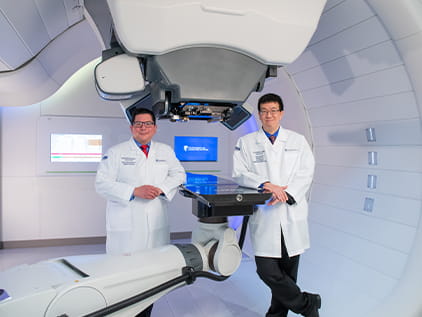- Home
- Contact Us
- Refer a patient
- Proton Therapy for Your Patients
- Proton Therapy Q&A with Ronald Chen, MD, MPH
Proton Therapy for Your Patients

Proton Therapy Q&A with Ronald Chen, MD, MPH
It’s been 1 year since the opening of the Proton Therapy Center at The University of Kansas Cancer Center. Ronald Chen, MD, MPH, an internationally renowned radiation oncologist and researcher, was instrumental in assembling the powerhouse team of proton experts from around the country to establish our proton center. Here, he offers his reflections about the proton center’s first year of operation.
Proton Therapy Center Virtual Tour
Ronny Rotondo: Welcome to the Proton Therapy Center, Kansas City's first proton center and the 39th proton center in the country. I'm Dr. Ronny Rotondo, medical director of the Proton Therapy Center at The University of Kansas Cancer Center.
Ronald Chen: And I'm Dr. Ronald Chen, chair of radiation oncology. Patients of our Proton Therapy Center receive top of the line care from a team of proton experts unparalleled in their region. This includes nationally and internationally renowned radiation oncologists, medical physicists and dosimetrist.
Ronny Rotondo: These specialists, whom we've recruited from across the country will create a customized treatment plan for each patient. Now, we want to take you inside our NCI comprehensive cancer center's proton therapy center. Here is Jessica Lovell to give you a tour.
Jessica Lovell: Hard at work inside the Proton Therapy Center is a pencil thin beam of light giving new hope to cancer patients across the region and beyond.
Jessica Lovell: Hello, I'm Jessica Lovell and welcome to The University of Kansas Cancer Center. I'm standing in what I like to call, the healing hallway that leads back to the proton treatment room. This is where you'll come after you check in at the front desk.
Jessica Lovell: The dogwoods symbolize rebirth but this wood frame is also symbolic. This curve right here, it's intentional. It represents the Bragg-Peak of the proton beam. The precise point where protons stop on a dime to deliver a prescribed dose of radiation to the tumor but not beyond.
Jessica Lovell: So come along, there's must more to show you.
Jessica Lovell: These are the changing areas where you will wait for treatment. There's an area for men and women. Children wait in here too but don't worry, they have plenty of ways to entertain themselves prior, in a family waiting area with TV, animated games, floor art and interactive programming they can take with them, even into treatment.
Jessica Lovell: Now before I show you the treatment room, I want you to understand the prep work that happens first. All proton therapy patients go through a process called CT simulation and treatment planning in the radiation pavilion just down the hall. The CT scan provides imaging to precisely localize the tumor that will require proton therapy. Here, some patients may have a couple of tattoo dots placed on their body to indicate where the radiation beam will be directed.
Jessica Lovell: No worries about any other medical devices you might have, your medical team knows what to consider and that's all part of your personalized plan.
Jessica Lovell: Are you ready to see the vault? That's what we call the treatment room. Come with me.
Jessica Lovell: One of the first things you'll see is this video projection wall. Patients can select from 14 different scenic lighting and surround themes. There are calming scenes as well as jungles, oceans and even outer space. It's all customizable for children and adults. The room temperature is kept at 70 degrees. That's because the proton equipment produces a lot of heat.
Jessica Lovell: Notice the subdued lighting. There's wifi for music. You may bring your own playlist or podcast too. The cyclotron that delivers the proton therapy is behind that locked door. The nozzle delivers the pencil thin beam of protons to the patient. The patient lays on the table, this is when the mask is positioned, if you have one. Images are taken, rotating 220 degrees as the treatment can be delivered from multiple angles and then the nozzle is set. The therapists then exit the treatment room and go to the console area to deliver the treatment.
Jessica Lovell: No worries, cameras and microphones mean the therapists can still see and hear you. Your tumor type determines the number of beams and the length of treatment.
Jessica Lovell: There is absolutely no pain from proton therapy. In fact, you can't even feel the proton beam at all.
Jessica Lovell: While treatment deliver takes just a few minutes, on average it takes 30 minutes to position patients perfectly. There is anesthesia for children and adults who may need it.
Jessica Lovell: Once your treatment is done, you may leave unless it's an exam day. Exams with your doctor happen every five treatments or more often as needed.
Jessica Lovell: Okay, there's just one more thing I wanna show you and that's the proton therapy bell that sits across from the nursing station. When your treatments are done, you'll get to ring it and we'll be right there celebrating with you.
Jessica Lovell: Remember, our medical team is a combination of highly skilled and nationally renowned proton therapy experts available in the region only at The University of Kansas Cancer Center and we thank you for trusting us with your cancer care.
Q: What was the biggest challenge, biggest learning, in the first year after opening the Proton Therapy Center?
A: With a new clinical program and a new machine, it is critically important to have a team that is experienced and not learning proton therapy for the first time. We recruited an incredible team to The University of Kansas Cancer Center from proton centers across the country. This ensures our patients receive the most effective and safest care possible.
Q: Tell us about the world-renowned team at The University of Kansas Cancer Center’s Proton Therapy Center.
A: Cancer treatment is much more than just having a treatment machine. It is just as important, if not more so, to have the best team of experts caring for each patient. Our proton therapy team members include:
Physicians: Our proton team currently has 14 physicians, and each specializes in certain cancer types. Many of these physicians have had years of proton therapy experience at other cancer centers and were recruited to The University of Kansas Cancer Center. Our physicians have been trained at top cancer centers – such as MD Anderson, Harvard, Johns Hopkins – and many are considered world-leading experts in their specialized cancers. We encourage patients to learn about our proton therapy physicians.
Medical physicists: Medical physicists are experts on the radiation treatment machine and ensure the machine is delivering proton treatment as accurately as possible. Our proton physics team is not only experienced with proton therapy but is also doing leading-edge research to continually improve proton treatment.
Dosimetrists: Dosimetrists create the proton treatment plan. For each cancer patient, we design the best proton therapy plan to treat their cancer while minimizing the radiation dose to surrounding organs. This is the most important goal, and it is essential to result in the highest chance for cure and lowest chance for side effects and organ and tissue damage. Achieving this requires the dosimetrist to have the expertise to determine the best machine angles and proton beam energies for each patient’s anatomy. Our proton dosimetry team is not only experienced, but one dosimetrist recently won a worldwide competition – creating the best radiation plan out of more than 500 entries from many of the best cancer centers around the world.
Radiation therapists: Radiation therapists deliver proton treatment every day. We have the most experienced proton radiation therapists in the region, with expertise in treating many different types of cancers including (in no particular order) childhood cancers, brain tumors, prostate cancer, breast cancer, head and neck cancer and others.
Nurses: We have a dedicated nurse navigator for the Proton Therapy Center who works tirelessly to get the patient through our doors and into proton treatment. In addition, our radiation nurses, just like our proton therapy physicians, are specialized. We have a prostate cancer team, breast cancer team, lung cancer team and more. This ensures each patient receives the best care, from their first consultation throughout treatment and then through long-term survivorship after completing treatment.

Proton therapy physician referral
If you have a patient who may benefit from proton therapy, we can help. We partner with referring physicians to ensure your patients receive top-of-the-line care and work closely with you to answer questions and ease the referral process.
Q: What are you most proud of in this first year of the Proton Therapy Center?
A: I am proud that we have built a comprehensive cancer program that not only includes the most advanced proton machine, but also an incredible team of proton specialists, recruited from all over the country, who truly care about patients. I’m proud that we have treated many patients from the Kansas City region and from many other states. We don’t just have a proton therapy center; we have built a comprehensive cancer program to ensure that every patient gets the best treatment that matches the type of cancer they have.
Q: What are you excited about and what’s on the horizon for the Proton Therapy Center?
A: Proton therapy, like many other forms of cancer treatment, continues to improve. I am excited about the research being conducted at The University of Kansas Cancer Center that will continue to make this treatment more effective and more accurate. Two areas of research that have the potential to dramatically change cancer treatment in the next 10 years are FLASH and GRID therapy using protons. Our team has a lot of ongoing proton research, including FLASH and GRID, and I’m excited about the potential to continually improve cancer treatment to benefit patients.
Q: What do you want referring physicians and colleagues to know about our Proton Therapy Center?
A: I would love the opportunity for our team to collaborate with referring physicians in the care of cancer patients. Our physicians would happily provide our contact information and make it as easy as possible to reach us to discuss any patient cases or needs.
Q: What makes our program different from other proton therapy centers?
A: A cancer patient isn’t just seeking proton therapy; they are seeking the best cancer treatment suitable for their specific diagnosis, from the best experts who can take care of them as an individual. What distinguishes our program from others is our expertise and ability to offer every cancer treatment option available, so that we can match the right treatment to each patient. If proton therapy is the best treatment for a patient, we also have the best team (including dosimetrists) to design the best treatment plan to target the tumor and spare other organs. All of this directly makes a positive difference in the patient’s outcome.
To learn more about our Proton Therapy Center or call for a consultation, contact us at 913-588-5862 or toll-free at 877-588-5862. The University of Kansas Cancer Center is here to assist you in caring for your patients.

NCI Designation
Our cancer center is 1 of fewer than 60 National Cancer Institute-designated comprehensive cancer centers nationwide. 
Clinical Trials
We are a pioneer in new clinical trial research that leads to innovative treatments. 
Still the Best
Our hospital continues to rank as the best in Kansas City and in Kansas
according to U.S. News & World Report.